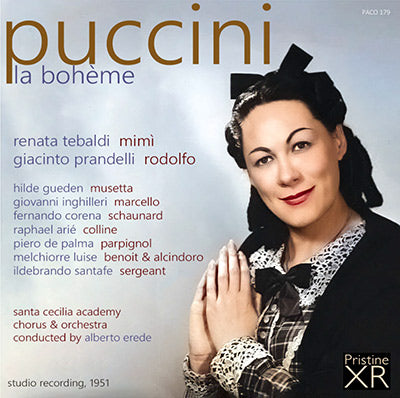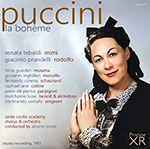
This album is included in the following sets:
This set contains the following albums:
- Producer's Note
- Full Track Listing
- Cover Art
There are various ways of listening to a new complete recording of an opera: some people apparently go through it, comparing each phrase with the way it was sung by Ferrani, Sammarco, Vanni-Marcoux or some other semi-legendary figure: I prefer to listen to the work as a whole, judging the singing in the main as a part of the total dramatic effect. (It is a truism worth repeating that an opera is not merely an extended vocal display but a presentation of dramatic action to music.) However, though there may have been bigger voices in the past, and though the top-note fanatics may remember, for example, longer and better high Cs at the end of Act I (where Puccini actually indicated only a bar-and-a-half's duration), it will I think be generally admitted that it would be difficult at the present day to gather a better cast than this - a cast in which there are no weak spots at all. Two sterling qualities stand out right away, qualities so rare in most singing to-day (especially Italian singing) as to be astonishing - intelligence and taste. Here are none of those tiresome "traditions" and vocal tricks (e.g. the last note ofehe gelida manina as a portamento C-E flat " di-hir" rather than a plain E flat" dir " as in the score) ; and, most amazing of all, here is a whole company actually observing pianissimo and diminuendo markings instead of trying to stun the back of the gallery with the force of their lungs - and, of course, making the music sound infinitely more moving in the process. Hooray for Erede!
Add to this that the work has been handled by engineers who obviously have heard opera for themselves in the theatre and know that the orchestra is as important as the singers and that a sense of stage perspective is desirable when making operatic records, and you will understand why I rate this issue as one of the best complete operas so far. The illusion of performance is admirable: the microphone placing is such that, for instance, we comprehend immediately that (before O soave fanciulla) the Bohemians' voices come up to the lovers from the street, or that (in act 3) the point of vision is the toll-keeper's booth, with the sweepers behind the barrier and Musetta in the tavern. Let me say, however, that the weak spot in this otherwise excellent issue is the quality of the orchestral recording (not the playing, which is as good as may be heard): the tone is fuzzy and out of focus, and though none of the later acts is as bad as act 1, the general effect is disappointing: on side 2 there is some buzziness at the start, and soprano high As and Bs become distorted.
But the merits of this issue are great enough to overcome these technical shortcomings. Tebaldi makes a charming and unaffected Mimi, whose Addio senza rancor and death-bed reminiscence of her first meeting with Rodolfo are most touching, and who only once - in Mi chiamano Mimi - from force of habit becomes the singer rather than the little milliner. Prandelli, with his lighter lyrical style, saves Rodolfo from being the crashing egotistical bore he too often is; his sensitivity and his dolcissimo singing are worthy of what has been called the sincerest form of flattery. All the rest of the cast are good, and a special word is due to Gueden, who despite the parrot cries that she is "insufficiently Italian," sings Musetta stylishly without the shrillness we get from most Italian interpreters of the part.
L.S. - The Gramophone, January 1952
Following the success and critical acclaim given to our XR-remastered 1950's studio opera recordings featuring Maria Callas, it seems only natural that we also turn our attention to her great "rival", and thus the classic Decca recordings of Renate Tebaldi. Decca were generally regarded as producing the better sounding recordings of the day, and certainly their operatic output by the end of the decade was in a class of its own.
But at the start of the 1950s, a time when recordings were still being made for 78rpm release as well as LP, and recording tape was still very much an infant technology, things were not quite there yet. This is where Pristine's XR remastering can make a huge difference to the sound quality over regular transfers as heard on the various issues available elsewhere.
The improvements here are at least as dramatic as heard in previous Pristine issues - here's praise for our 1956 Beecham Bohème from two Fanfare reviewers:
"The most recent version in my collection is a 2002 EMI Great Recordings of the Century restoration, with excellent sound. But a new Pristine Audio XR remastering by Andrew Rose is even better; in fact, dramatically so. Both the voices and orchestra emerge with far greater definition, impact, and color. Although the recording is monophonic, you won’t feel at all shortchanged by the sonics as captured in this restoration." (KM, Jan/Feb 2020)
"Anyone who loves this recording will want the Pristine transfer, and even those who have reservations about the performance should hear it. There is so much more color and warmth to the voices that the performance takes on a glow even beyond what we all thought was present before. Victoria de los Angeles benefits the most, emerging with a richness of tone that was lacking in all prior editions." (HF, Jan/Feb 2020)
We hope to bring this kind of improvement to many more of these fabulous opera recordings in the month and years ahead. In the meantime we hope you'll enjoy this superb Bohème, sounding infinitely better than it ever has before!
Andrew Rose
PUCCINI La Bohème
Disc One
ACT ONE
1. Questo mar rosso (4:28)
2. Pensier profondo! (1:08)
3. Abbasso, abbasso l'autor! (3:45)
4. Si può? (4:07)
5. Al Quartiere Latin (1:48)
6. Non sono in vena (3:50)
7. Che gelida manina! (5:06)
8. Sì. Mi chiamano Mimì (5:44)
9. O soave fanciulla (4:12)
ACT TWO
10. Aranci, datteri! (2:36)
11. Chi quardi? (5:14)
12. Beviam. Ch'io beva del tossico! (3:08)
13. Quando men' vo (4:27)
14. Chi l'ha richiesto? (2:29)
Disc Two
ACT THREE
1. Ohè, lè, le guardie (4:46)
2. Mimi?! Speravo di trovarvi qui (4:47)
3. Marcello. Finalemente (1:39)
4. Mimì è una civetta (4:18)
5. D'onde lieta uscì al tuo grido d'amore (3:05)
6. Dunque è propro finita? (5:45)
ACT FOUR
7. In un coupé? (1:19)
8. O Mimì, tu più non torni (2:49)
9. Che ora sia? (4:04)
10. C'è Mimì (5:39)
11. Vecchia zimarra, senti (1:54)
12. Schaunard, ognuno der diversa via (1:44)
13. Sono andanti? (4:56)
14. Oh Dio? Mimì! (5:45)
CAST
Renata Tebaldi (soprano) Mimì
Hilde Gueden (soprano) Musetta
Giacinto Prandelli (tenor) Rodolfo
Giovanni Inghilleri (baritone) Marcello
Fernando Corena (bass) Schaunard
Raphael Arié (bass) Colline
Piero de Palma (tenor) Parpignol
Melchiorre Luise (bass) Benoit & Alcindoro
Ildebrando Santafe (bass) Sergeant
Santa Cecilia Academy Chorus & Orchestra
conducted by Alberto Erede
XR remastering by Andrew Rose
Cover artwork based on a photograph of Renata Tebaldi as Mimi in La Bohème, early 1950s
Recorded by Decca, July 1951, Santa Cecilia, Rome, Italy
Recording producer: Victor Olof
Recording Engineer: Gil Went
First issued in November 1951 as Decca LXT.2622-23
Total duration: 1hr 44:32
CD1: 52:02
CD2: 52:30

